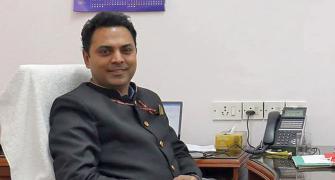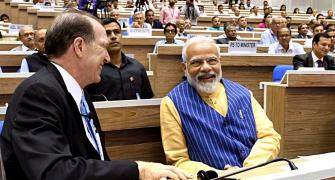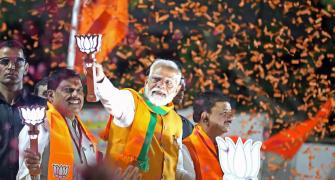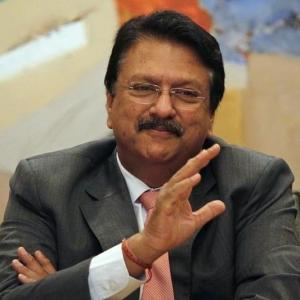'Should the most important part of economic reform not comprise the way we look at the fiscal deficit?', asks T C A Srinivasa Raghavan.
Illustration: Dominic Xavier/Rediff.com

We are now well into the Great Indian Slump.
To reverse it, the main contours of the reforms that are required are clear.
Some of them will get done. Some won't. That's how it is.
But here I want to reiterate something I have been saying for several years: Should the most important part of macroeconomic reform not comprise the way we look at the fiscal deficit?
That is, if increased or lowered government expenditure is the main instrument of equilibrating the labour and product markets, should not such expenditure be broken into two parts?
Should not one part be the one which, if reduced, increases political risk for the government, and the other which, when increased, enhances economic benefits (as opposed to just commercial ones)?
The revenue deficit, after all, is the one in which political risk is deeply embedded.
Economic benefits, however, flow from investment expenditure.
The two, I suggest, need to be separated for financing purposes.
In the old days, before the distinction was abolished, they called it plan and non-plan expenditure.
We need to revert to that but with a further refinement.
Even non-plan expenditure should comprise two parts.
One whose reduction entails political risk -- subsidies, and salaries and pensions; the other is higher maintenance expenditure, whose enhancement improves overall productivity.
At present any increase in the former reduces the latter and this happens every year because there is an election or two every year.
That's why public infrastructure is so awful.
Delhi under Arvind Kejriwal is just one example.
The only new thing I am saying is that expenditure on mitigating political risk should be explicitly separated from expenditure that entails economic risk.
This is necessary to avoid perpetuating the important hypocrisy that is inherent in a competitive political system, namely, deliberately equating political risk to the ruling party with its concern for welfare of the poor.
It's only after this is done that a target for the fiscal deficit should be set.
It can then indeed be 3%.
In the absence of such transparency, we have had an acceleration in the window dressing of Budgets.
It's always been there, but the UPA, with the MGNREGA, took it to new heights from the Budget for 2005.
The practice has continued unabated since then.
It's time for Nirmala Sitharaman to stop it.
She should convince the prime minister to tackle this problem head on.
Otherwise, the government will always be under needless pressure and end up, as it has done since 2014, deflating the economy more than is necessary.
It has done this by pursuing unnecessarily low fiscal and fashionably low inflation targets.
Furthermore, the political parts of total expenditure should be financed from tax revenues and the economic parts by deficit financing.
Next, the political part should have the equivalent of the British PSBR (public sector borrowing requirement) limit, which is not negotiable for five years.
The central government shouldn't spend more than what it is doing currently on subsidies, salaries, and pensions.
It's only higher interest payments that it should pay when it borrows to build new things.
It should not borrow for anything else.
All incremental expenditure on political heads should, from next year, come from the states -- after allowing them to levy a tax on individual incomes.
There is no reason why income tax should be a central monopoly.
The distinguishing feature of a good priest is utter and unquestioning conformity and sticking, regardless of context, to the scriptures.
Today this requirement has got into the macroeconomists' bones.
The result is a one-size-fits-all approach, which is idiotic.
If you look back at the history of macroeconomic thought -- such as it is -- you will find that all successful governments discarded the old wisdom for what they really are: The comfort blankets of mediocre economists.
Franklin Roosevelt is the best example of this. So are Margaret Thatcher and Ronald Reagan.
Governments need intellectual legitimacy for what they do.
Keynesian theory has been providing that since 1950.
But it needs tweaking now because as far as I know, Keynes didn't place a limit on government deficits.
He merely said spend what it takes to pull the economy out of the hole.
The emphasis was on spend, not limits.
And all-powerful bond markets were nowhere in his mind.
We now need to go back to Keynes in the original, and not follow his interpreters, least of all the ones in the IMF, who are the high priests of the one-size-fits-all doctrine.
No government should become hostage to the prescriptions of such mindless orthodoxy.










